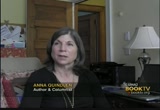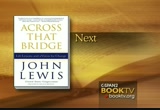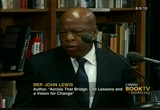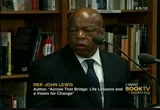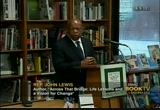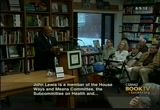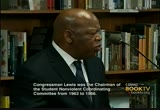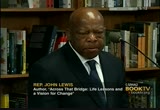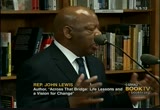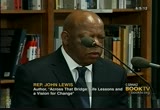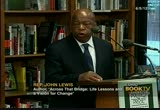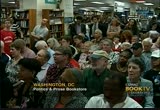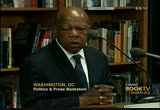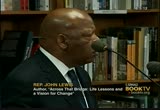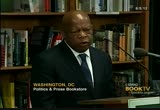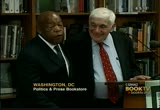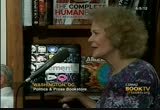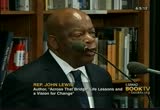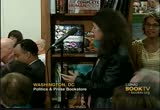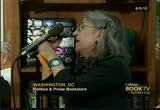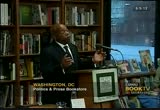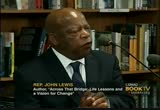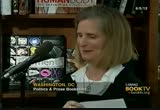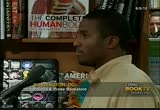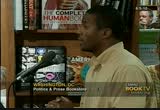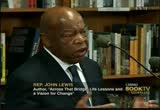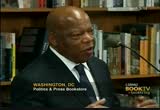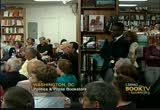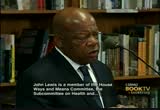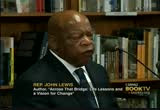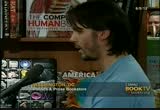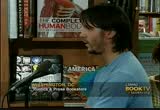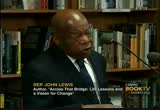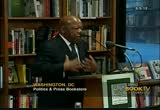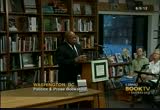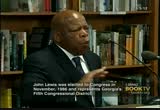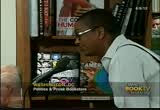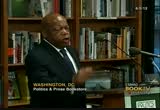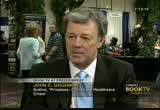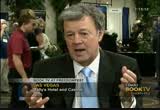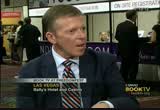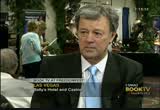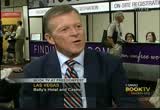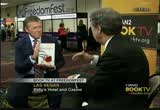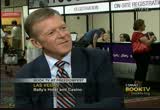tv Book TV CSPAN September 9, 2012 10:00am-10:45am EDT
10:00 am
10:01 am
upon a new generation of back to this. this is just under 40 minutes. [applause] >> good evening. you're a beautiful group. you're just beautiful and handsome. i want to apologize for coming in a little late. we just completed a series of votes, but i'm delighted and very, very pleased to be here. my friend and my brother, thank you for those kind words of introduction. julian bonds, my friend, it thank you for being here and thank you each and everyone of you for being here. it's good to be here at politics & prose again. i remember when i was here in june of 98, it was raining and storming iowa to atlanta and it
10:02 am
was raining and storming and i told the one-story, walking walking with the wind. but tonight i'm not going to tell the wind the story. now, many of you know from my past that grew up in a rural alabama. 50 miles from a country i sat at a place called troy. my father was a shock rocker, tenant farmer. nat 44 when i was four years old and i remember when i was four. how many of you remember when you are four? would have been to the rest of us? [laughter] honestly and we raised a lot of cotton, cats and chickens. it was my responsibility to care for the chickens and i fell in love with raising chickens like no one else could grace chicken. i became very good at raising chickens.
10:03 am
this chickens time is something one before it got involved in the liberal rights movement. they tap the patients. they taught me to wait. they taught me to never give up and never given, that those in with fresh eggs in three weeks then we'd have some little chicks. but the philosophy and the discipline are nonviolent but i came to embrace when i was only about 18 years old. back in 1855 at the age of 15, i've heard of rousseau parks and the cooking junior. i heard dr. martin luther king junior talking about nonviolence in path of resistance. as a young person, i started studying the way of peace, the way of love, the way of nonviolence. to lay down the burden of
10:04 am
bitterness, the burden of hate and try to move to areas that sense of one family, one people, one house. in this little book, "across that bridge," i tried to suggest that there is a better way. there's a better example of moving toward a sense of community, not just american community, but the world community. what is faith all about? in keeping with the philosophy and nonviolence jubilees somehow and someway pressure point to succeed and overcome, but you have to be persistent and you
10:05 am
have to insist. you have to be literature he planted by the river's water, district anchored, that you may be beaten me make it arrested or you may go to jail over and over and over again, but she had to keep the face. keep your eyes on the prize and never, ever give up. never give in. before we went on and he said in, any march, before but on the freedom rides in 1961 committee saying that the president barack obama was born, we studied, we prepared ourselves. i came to washington d.c. the first time in may of 1961. 13 of us, blacks and whites,
10:06 am
preparing to go on the freedom ride. we met greater washington d.c. 21 years old at all of my hair and was a few pounds lighter. [laughter] restudy, we prepared ourselves. to name a third, 1961, we went down to a chinese restaurant rate here in washington d.c. for a meal. growing up in rural alabama come to school in nashville, i've never been to a chinese restaurant, never had the food. but the night of may 3rd, someone said you should eat while because this may be like the last supper. i'm a forthcoming 1961, reported a greyhound bus and traveled from washington to virginia.
10:07 am
we arrived in a little town called redfield, south carolina. we were attacked and beaten and left bloody. one of the same young men attacked and beat me in my seat may came to my office in february 09 and said mr. lewis, i'm one of the people that attacked and beat you. i want to apologize. we forgive me? yet been encouraging his father to seek a people he attacked. started crying, father started crying. they both gave me a hug and i started crying. this book speaks about
10:08 am
reconciliation, the ability and capacity to be reconciled, to move towards community, that if you believe in something you should speak out, speak out. you should stand up and you should pay for it. you have to be consistent. you have to insist. nothing, nothing, not one thing is stronger than the truth. there may be some set back. there may be some disappointment . but in a long scheme of things you're going to win, you're going to succeed. the way of peace, the way of love, the way of nonviolence, the way of shrews will win out.
10:09 am
this book is suggesting whether it's in the middle east, africa, america or any part of this planet, this little piece of real estate that we call earth that we can, as stock or king suggested, learn to live together as brothers and sisters. going to put it another way, it is nonviolence or nonexistence. it is my hope that young people and people not so young reuse across that bridge to find a way to get in the way. the final way to get in trouble,
10:10 am
good trouble, necessary travel and disturb the order of things. when i was going up, my mother, father, parents and great grandparents they don't in trouble, don't get in the way. and through study, through listening, through being patient, i got in trouble, good trouble and necessary trouble and i feel that it's time for the american people to get in trouble again, good trouble. [applause] i see people in us a nation we are too quiet. we need to make some noise. we need to push and pull and do what we can to reteam the soul of america. and save this little planet, not
10:11 am
just american community, the save this planet for generations yet unborn. i happen to believe through years of work and service that the vote is the most powerful nonviolent tool that we have in a democratic society and we have to use it. there is an attempt, a deliberate systematic attempt to make it almost impossible for people to participate in the democrat. some of us give a little blood. i only gave a little blood on the bridge in 1965. some of my brothers and sisters and probably gave their lives. we cannot afford to let people
10:12 am
steal an election before the election takes place. so use this book -- use this book to guide you during the next few days, weeks, months in the next few years, just get out there and do your best to bring together not just american community, but the world community. and never, ever let anybody tell you that you cannot make it, you cannot do it. just go out there and do it. take riding, standing, walking, running, do it. but speak up, speak out. get in the way, make some noise.
10:13 am
in the hole double workout with other bridges to cross. it's bridges all over our land that we need to cross. we used the way of peace, the way of love. sometimes i wonder what's going to ruin our society? is there some in the food we eat, but what are, the air we breathe? can we be a little bit more human? can we be kind to each other? can we say excuse me, i'm sorry, i apologize?
10:14 am
we don't put people down because of their race, color, class and orientation. we can do better and we must do better. we can emerge as a model for the rest of the world. thank you very, very much for being here. thank you. [applause] >> and what they have to say, this is the very first book signing. i've sent a few here and there, some of the colleges and universities around, but this is the very first and this is amazing to me. this is amazing, to see each and
10:15 am
every one of you here. the thank you very much. thank you. >> are going to begin with the questions. microphone is in the middle, so we have to clear and i'll said people cannot spend. please try and be brief with your questions and we will begin our wonderful -- continue our wonderful evening and really have a national public meeting. >> well, this is fairly obvious, but the one group, a mixed group of people who are organizing and speaking out are the tea party and related types. they are not preaching a message of love. they seem to be against any sort of conciliation and compromise
10:16 am
and you have to deal with some of these people every day. what is your thought on where this is going? >> well, it's my belief because of my faith and sense of hope. some people seem too optimistic, but i'm not prepared to give up on anyone. i am not prepared to give up on any single human being. during the past few years and faith in politics, julian bond been doing some of this. we've been taking members of congress on a journey back to birmingham to montgomery. at one member of the united states senate from a sudden state. i'm going to call his name. a few years ago he said to me,
10:17 am
john, if i'd been on this trip before, voting record would be different. sometimes you have to bring people to the point so they can be informed, they can be educated and be inspired. >> hi, my name is to be that kavner on the board d.c. folk. the voting rights activists as a political work and that senator blair brown eyed. how many people of the district of columbia? on the votes to have a congress? big zero. so what do we do? is most frustrating thing in the world. we do not have a break in the district of columbia. >> you should have it. it was left up to me as a dictator or just make it happen really. [applause] >> let's come up with some creative -- by the way, we are honoring julia bonanno at our annual dinner this fall.
10:18 am
[applause] really, what can we do? its most frustrating thing. a >> continue to organize and mobilize and don't become frustrated and give up. >> no, we don't give up. >> we need more members that will stand up and vote for d.c. that's what we need. organize your friends, the land to vote the right way. >> i strongly believe that your kurds did not stop on that bridge that day. as an american jew come i appreciate so much you and julian bond not attending the million man march.
10:19 am
and as a heterosexual ally, i am thrilled with what's been going on at the african-american leadership community. you, julian bond, and many others, colin powell and the naacp recent vote. so i want to know -- i heard you talk about this on the radio, but i want to know what can we say to our african-american friends and others who are such good people, well-meaning people who have been caught up with the issues of civil rights for lgbt and same-sex marriage. what we do to bring them the last piece of civil rights? >> my responses so many friends and others have said something like what dr. king would say from time to time.
10:20 am
people would ask him about interracial marriage. dr. king was there. bases still fall in love and get married or individuals fall in love and get married. and also by far too long and too proud against discrimination based on race and color, not to be against discrimination based on orientation. if two guys or two women what to fall in love and get married come it's their business. no state and federal government should tell people what they can do. you cannot build a wall and make it equal for some people and not equal for others. i think the 14th amendment to the constitution -- i'm not a lawyer, but it's my belief that you cannot have equality for
10:21 am
some and not for all. >> hello, congressman lewis. i am herewith a few of my students. i do not remember, mr. wonderful invited us all to come speak with you a few weeks ago because we were going on just the kind of trip you are talking about, global eighth-grade class. >> yes, i remember very well. thank you for being here. >> we are delighted because the visit to you so inspired us on our trip to when we got back from our trip we went to birmingham, montgomery and atlanta and made a little documentary of the trip and turned it into a little book for you. and turned it into a little book for you. dear john lewis, the a little book for you. dear john lewis, the civil rights journey. [applause] >> a few of my students are
10:22 am
here, but decadent little shy, so i'd be in their a together in class we told the story and i was there scribe would put it into this book. do not thank you very much. i look forward to reading it. [inaudible] >> thank you for being here. [applause] >> how are you doing, congressman? >> sign, how are you? >> i recently moved to d.c. and i just want to contextualizes question a little bit. i recently loved working at goldman sachs and decided to pursue a career working at d.c. public schools because i felt i needed to be an example to young african-american males as well as females are just low-income students because i was once a free and reduced lunch recipient. my mother was on welfare. my question to you though as i
10:23 am
challenge a lot of my peers in the african-american and minority communities working on wall street as well as others that i know that are doing quote, unquote, successful careers, how do we reenter china 30 years, were the most educated from these communities as well as when you look the civil rights movement, a lot of the help and resources provided organically i felt and just reading is a history major in undergrad, organically and from low-income communities were insulted a lot of resources are people who are from these communities come in and provide help. i feel like you can only get so much of those providing that how far from the same soil in which you come from. so how do we get organ people like myself back into the community, working to better their community so they can have the next big push that she so
10:24 am
ardently sought or while you were in your youth? >> well, i think it's important for all of us to give back. you have to inspire, educate, inform people that they can bake a difference. they can make a contribution. dr. king said we ought to be great because we all can insert. i think there's a great need for people who love some of these communities to go back and be fair, especially in some of the inner-city schools tc blackmails is important. i admire other young people working to teach for america. all over the place, and the small young people and more and more people of color are involved. young women, young men, but we need our african-american males.
10:25 am
we need that image. we need people in the classroom leading, standing up, showing people the way. we need to get our people to hear the call and just respond. >> and i think i explored the option of teach for america. but as a savvy person, when you look at teach for america and their board as a savvy student, there's no african-americans on their board. and so if i can admit that branding and i'm telling the students you can be what you want to be or whatever you so choose and they say that they research the organization, there's nobody looks at me on there. >> i'm not so sure. >> african-american males. >> are a few females. >> you think there's one or two. they've done a great job. i muskets and african-american males males on the board.
10:26 am
luscious do it, were together make that happen. i'll work with you. i know director and pilot of the program. >> thank you. i appreciate all your hard work. if it wasn't for you of an accomplished the things i accomplished. >> thank you for which you're doing. just go for it, brother. [applause] >> congressman tried to commit thank you for your courage we will be forever indebted to you. my question goes to 1963 march on washington. it was written as you are asked to tone down the speech. as you reflect back to that time, would you do that over? >> yes. julian bond should respond to this. julian was the communication director for the student not violating court dating committee had he made advance copies available to different people
10:27 am
and some people texted a speech and and didn't like it. but they thought it was a little too radical, maybe a little too militant for the day. do you read the words today, really it's just scary soft and meek really. but mr. randolph --a philip randolph and others came to me. there were people in the administration are concerned about some of president kennedy and the beginning. they like the idea of a march on washington. he thought it would be violence and chaos and disorder and he told us we would never get us to the ranks for the congress. you could bring hundreds and thousands of people to washington. and mr. randolph spoke up and said mr. president, this would be an orderly, peaceful, nonviolent protests.
10:28 am
and that some of us spoke. doc or king was last speaker. i spoke number six out of 10 people that spoke that day. but there were certain words, certain phrases that i used. i didn't think that the proposed civil rights bill was strong enough to protect people in the south than i thought the speech we had prepared was a reflection of the people we were working with in the deep south, in southwest georgia, in the black out of alabama. so mr. randolph came to me and said, john, for the unity we come together to make these changes. and at one point dr. king said, john, that doesn't sound like you. you may change your? i couldn't say no to a philip
10:29 am
randolph. he was one of the most principled individuals you ever wanted to meet. if this man had been born in another time, maybe on another continent, he would've been maybe prime minister, president. he was just a wonderful, wonderful human beings. for some of those meetings to say the exact brethren, let's stay together. brethren, if you cannot say something good about him and, don't say anything. anyhow that group together and we made the changes. thank you. >> hello, congressman lewis. >> hello, how are your? >> i'm going to be brief and failed miserably because i have too many words whenever this thing is.
10:30 am
basically i guess my main question -- i love what you said about getting in the way of doing things different because the biggest problem we we have in society's patterns. who gets stuck of patterns of brainwashing some would have you. and you have to act a certain way and do things a certain way just because your parents told you or the church told you or what have you. so i like what you said about getting in the way and going up to the microphone and hold an appearance at and wearing a blue shirt and making a fool of yourself just because you know you have to and you know that john lewis is an amazing man with a good message. but in the end, this is what i wanted to ask. everyone in this room, you know, clearly you have moved everyone in this room that we want to cause change, you know, break the pattern, help society and eventually hope the world and hopefully end all wars. people say will never happen, but that's just pessimism. that's another patterns.
10:31 am
so basically my question is, what can i do? what can every single person in this room do to make a change happen in the world is opposed to just those in a speech, but then moving on to watching will and grace or whatever after this. >> welcome you to come together, organize, mobilize, get out and vote and be prepared and willing to engage in peaceful well organized, well disciplined action. you know, we pray, sometimes we have to just get out and be prepared to move our feet. dr. king used to say there's nothing more powerful than a determined people. people then think we would
10:32 am
succeed. some people say we succeed whether walk across the bridge. but the president has said that he couldn't get a voting rights act to go to congress. we created the climate. we created the environment in a matter of the short time, the same president, and so speak to the joint session of the congress the days after bloody sunday. sometimes we have to make politicians say yes as dr. king would say, when they have a desire to say no. you to create the climate, create the environment. >> there's other people and this woman just rudely said behind me. i have to say because remember what it is. the power of love has to overcome greed and hate. how do you do that? >> just love everybody. just love everybody. don't have any ill feelings or
10:33 am
bitterness. it's a better way to live. >> i love the woman right next to me. thank you very much. >> thank you, mr. chairman. >> hi, congressman lewis. for your? >> i'm an editorial intern with regular politics. i just want to say first of all that i love your parents on stephen colbert show. i do feel he could have been a little more friendly to you. >> he was very friendly. >> i guess my question is very brief period in the end of april 18, fox news reported a poll that said 70% of americans feel we need voter i.d. laws. i'm just curious of your response to that. >> well, i think is a step backward, you know, i engaged a form of voter suppression. what are you going to say to people who never ever had a
10:34 am
drivers license, to people who live in a remote part of america? you're going to deny someone 90 years old the right to participate in a democratic process because they failed to come up? if someone came up and said i'm john doe. i live at 1516 smith avenue in southwest atlanta, you're going to start to say you may not be legal or you may not be who you say you are. but some faith in the american people. we should be opening up the process of letting more people come in. [applause] more than 4 million people were turned away at the polls that the last national election. and 50 million are of voting age were not even registered. we just need to make it simple.
10:35 am
one person, one vote. and let people come in. let people participate. don't be afraid of the american people. >> command picked up eric holder's voting ballot. these incidents don't bother you? or you don't think there could be more? >> i don't think there's anything like that on a large scale. >> there could be other isolated incidents on a large-scale? >> i faith in the american people. i trust the american people. i don't want to go back. i want to go forward. >> thank you. [applause] >> hi, looking forward to reading your latest book in a richer first one. it was great. i was curious, congressman, after which harry belafonte's biography can i came back and reread the portion of your book when he went to guinea after the
10:36 am
summer of 64. purchase wondered if you could talk about what the trip ntu. it was interesting hearing him talk about it after reading what you did and coming back to read your portion in your book. >> just briefly have its say was a great trip. my friend julian bond was on the trip. it was a wonderful trip. harry belafonte being some money. how many thousands of dollars? 13 of us on a trip to west africa and have never been to africa before. and i learned a great deal. there is another student, staff person able to get some additional funds. during those days it was cheap to travel. so they got a few more dollars with the taken away traveled all over the place really. i learned so much. i came back a better and stronger person. thank you.
10:37 am
>> thank you. >> julianne, do you want to add anything? [laughter] thank you so much. thank you so much. >> but a great evening. thank you. [applause] >> well, this is the cover of john goodman's newest book called "priceless: curing the healthcare crisis." but tv is on the kishinev freedom las vegas and dr. john goodman joins us now to talk about "priceless." let's start by asking about the recent supreme court decision on the health care bill. what is your view? >> guest: well, i was starting
10:38 am
to see that decision. i wish the court out drawnout obamacare we could have more rational health care reform. now we have to do with the law as it is amazing that even the supporters of the law are going to want to make major changes in the next year and a half. >> okay, what do you want to see? what you see is rational health care? >> what we have in the obamacare a lot as a law that you and i buy an insurance plan at twice the rate of growth of our income. you don't have to be an accountant to know that if you're paying for something, it's going to crowd out everything else you're consuming and eventually have nothing to eat, nothing to wear, but showed lots of health care. that's an impossible payout. >> the national center, and cpi is one of the founders of the health savings, current?
10:39 am
>> that's correct. >> what are they? >> health savings account people own and control allows them to have their own health care dollars. most fun when they go to a high deductible plan and put framer savings on the capital workers that they cut the overall cost in the plan by as much as 30%. employees are happier because they get to spend money in the way they want to. >> and hsa -- how many people are using hsa? >> about 24 million people are managing their own money and a health savings account or something to much of a health savings account. >> and what does the law say about hsa? >> gluttons very strict dude. you have to have an across-the-board deductible and if you don't you can have one. i don't like that. the law should be flexible. most people in this country would have a health savings account. >> you also mentioned with regard to health care legislation that the supporters
10:40 am
of the current health care bill won't want to make changes. what are some of those changes you perceive them taking? >> you've got to give them the opportunity to choose a plan that a scaled-down benefits, higher deductible. if you can't control cost any other way, they have to adjust the plan they're going to buy in the obamacare legislation has very strange subsidies. the employees of this hotel for $10, $15 an hour will have to have a family plan that costs $15,000 an hour. that's half their wages. the new law gives no help to the employees of the hotel. on the other hand, at the hotel abolishes its insurance plans and since employees to a new exchange, they're going to get 10,000 packaging thousand dollars in subsidy from the government. the few businesses start to restructure coworkers is their job. at some point people say there's got to be a better way than
10:41 am
this. >> you were speaking here at freedom fest. what is the topic of your talks and what is the message you want to get out? >> oksana tabula the book. on the one hand your health care is priceless anon the other hand we have no real prices. none of us ever sees the real price for anything in health care. that's the problem. you don't see real prices is everybody faces observes incentive to make costs higher, access more difficult. if you want to solve our health care problems we have to restore power to the patient. >> can be requested ever going to the doctor? >> you can't find one. the only place you see the prices as those markets where insurance companies aren't. if you walk into a clinic or cvs pharmacy. if you want into a normal
10:42 am
doctor's office they don't know the cost of anything is. >> so how do we get to where there's an actual priceless or we know what things are costing? how does that benefit the consumer? >> first we have to empower the patient and let them control more of the dollars. and you get an immediate response on the supply-side.yours compete on price and quality. you see that in cosmetic surgery to mocking the planet. and when you have that, all of a sudden you find a real price of care going up good >> is there a government role? how do you see the government and health care? and do you see the government? >> the government solves both of our problems. particularly from government subsidizing private health insurance, take all that money, give each of us the same amount of money to purchase health insurance come about $2500 for an adult.
10:43 am
$8000 for a family. that is your tax subsidy. you can spend additional money, but that's after taxes. >> what he made? >> right now we don't. right now you get a nice subsidy. if your employer provides you with the plan you get no tax relief, purchase insurance underwrote good under obamacare inequities are the worse. step one would be treated everyone the same. buy insurance to matter you are and where you get it come the same amount of help from government. >> what about insurance companies. what is your role in reforming the health care system? >> right now that the bureaucracies. they need to be liberated, too. we need real insurance. you want to insure against preexisting conditions. you do that when you buy life insurance. then you get prostate cancer test. you don't pay a higher premium. they don't kick you out of the plan and health insurance should be the same way.
10:44 am
>> people often compare health insurance policies to auto insurance policy. can they be the same or similar? >> i wish they were because with auto casualty insurance to see the commercials on tv saying look, something that happens to you, will be there for you. and health care will get the opposite. they don't want anyone with the problem. they did much in the first place anyway should go someplace else. so we have given the insurance companies bad incentives to take care of us. >> said john goodman, when it comes to preexisting conditions, does the government have a role in saying yes, you need to ensure preexisting conditions? >> yes, but you don't want to join a plant via premium to live the cost of your kid because the insurance companies are going to what human is goin t
152 Views
IN COLLECTIONS
CSPAN2 Television Archive
Television Archive  Television Archive News Search Service
Television Archive News Search Service 
Uploaded by TV Archive on

 Live Music Archive
Live Music Archive Librivox Free Audio
Librivox Free Audio Metropolitan Museum
Metropolitan Museum Cleveland Museum of Art
Cleveland Museum of Art Internet Arcade
Internet Arcade Console Living Room
Console Living Room Books to Borrow
Books to Borrow Open Library
Open Library TV News
TV News Understanding 9/11
Understanding 9/11